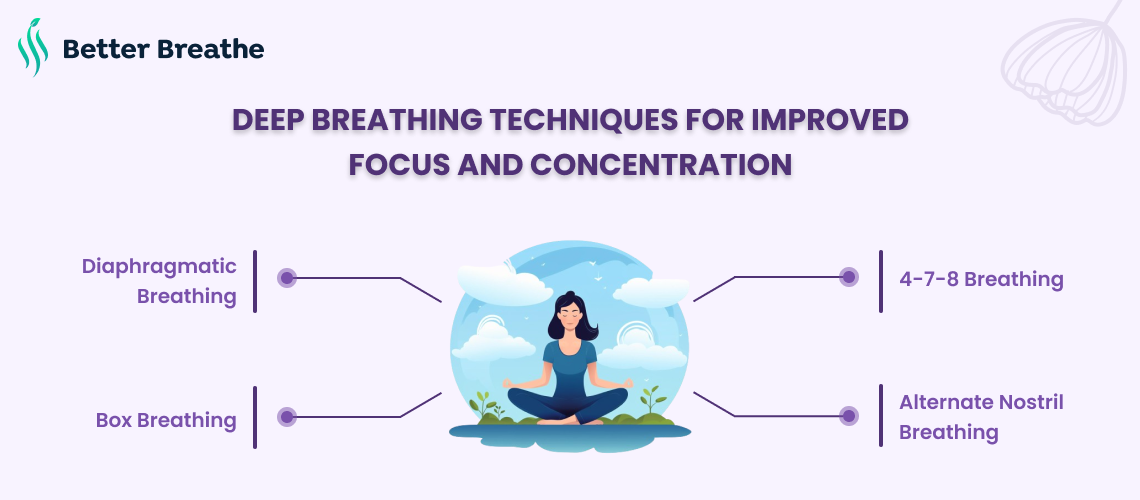Blog
Blog Details
Better Breathe, Better Live: Deep Breathing for a Healthier You
Feb 28, 2024
4 min read

Breathing is a fundamental aspect of our existence, yet we rarely pay attention to how we breathe and its impact on our overall health and well-being. Deep breathing is a powerful tool that can significantly improve your physical and mental health. In this article, we will explore the benefits of deep breathing and how you can incorporate it into your daily life.
Breathing is an involuntary action that we often take for granted. We rarely think about it unless we encounter difficulties in doing so. However, understanding the significance of breathing and its impact on our overall health can lead to transformative changes in our lives.
To appreciate the benefits of deep breathing, we must first grasp the basics of our respiratory system. Our lungs, diaphragm, and airways work harmoniously to ensure the exchange of oxygen and carbon dioxide.
Oxygen is vital for our cells' energy production, while carbon dioxide must be expelled from our bodies to maintain a healthy pH balance.
One of the most immediate and noticeable benefits of deep breathing is stress reduction. It activates the body's relaxation response, lowering cortisol levels, and promoting a sense of calm.
Deep breathing exercises enhance lung capacity, improving the efficiency of oxygen exchange and overall respiratory function.
Deep breathing boosts brain oxygen levels, leading to improved concentration, better decision-making, and enhanced creativity.
Proper oxygenation through deep breathing can aid in digestion as oxygen plays a role in breaking down food and absorbing nutrients.
Deep breathing supports the immune system by increasing the production of natural killer cells, which help defend against viruses and cancer.

There are various deep breathing techniques to choose from, each with its unique benefits. Let's explore a few of them:
Also known as belly breathing, this technique involves using the diaphragm to breathe deeply and slowly, expanding the abdomen.
Box breathing is a structured technique that involves inhaling, holding, exhaling, and holding the breath for equal counts, creating a square pattern.
This technique focuses on a specific rhythm: inhale for 4 seconds, hold for 7 seconds, and exhale for 8 seconds. It's known for its calming effects.
This yogic practice involves alternating the breath between the left and right nostrils, balancing energy, and calming the mind.
To experience the full benefits of deep breathing, follow these guidelines:
Choose a peaceful environment where you can concentrate without distractions.
Ensure your spine is straight by sitting or lying down in a comfortable position.
Maintain a steady rhythm, inhaling deeply through your nose and exhaling slowly through your mouth.
Aim for at least 15 minutes of deep breathing daily.

Incorporating deep breathing into your daily life can be surprisingly easy and immensely beneficial.
Begin your day with a deep breathing session to boost energy levels and reduce morning stress.
Take a break during your busy day to recenter and recharge with a quick deep breathing exercise.
Unwind before bedtime with deep breathing to improve sleep quality and reduce insomnia.
While deep breathing is simple, there are some common mistakes to watch out for:
Avoid shallow breathing, which limits the benefits. Focus on deep, full breaths.
Don't push yourself too hard. Gradually build up your deep breathing practice to avoid strain.
To experience lasting benefits, make deep breathing a consistent part of your daily routine.
Incorporating deep breathing into your daily routine is a simple yet powerful way to improve your overall health and well-being. By harnessing the benefits of deep breathing, you can reduce stress, enhance your cognitive function, and boost your immune system. Elevate your experience with premium features and services available on Better Breathe, downloadable from both the App Store and Google Play Store.